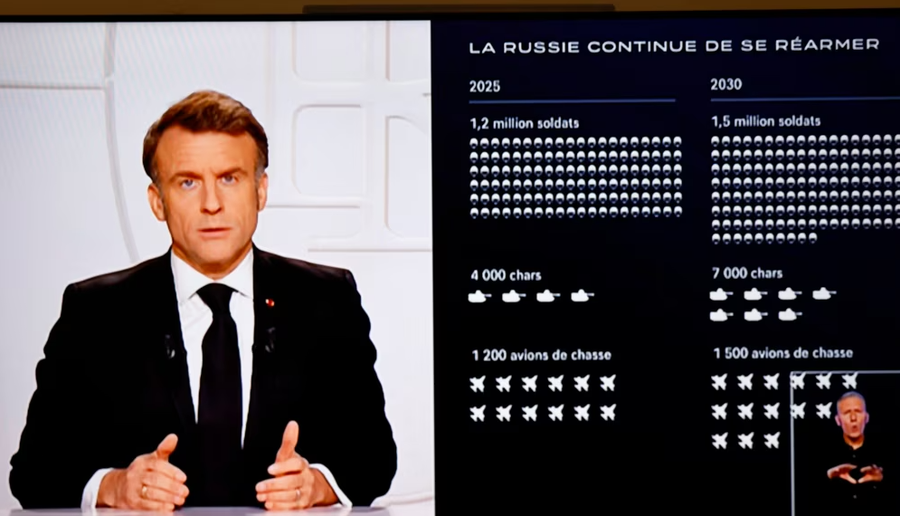
French President Emmanuel Macron said on Wednesday it would be "madness" to ignore the threat Russia now poses to Europe and stressed that he is open to talks on extending France's nuclear umbrella to Paris' allies on the continent.
He made these comments on the eve of an emergency meeting of European Union leaders, expected to be held today in Brussels, to discuss increasing the military budget, which is a significant request from the US administration due to concerns about Washington's commitment to NATO and European security issues.
Macron said in a televised speech that "our nuclear umbrella protects us: it is complete, sovereign and entirely French."
"However, responding to the historic call of the future German Chancellor [Friedrich Merz], I have decided to open the strategic debate on the protection of our allies on the European continent through our [nuclear] umbrella," he added.
Macron also said France would have to spend more on defense and pledged that Paris would continue to support Kiev in its fight against the Russian occupation, which has entered its fourth year.
"Russia has become a threat to France and Europe," Macron said. "To watch and do nothing would be foolish."
He said he hopes the United States "will remain by our side" - but added that Europe must be prepared for the opposite.
"The future of Europe does not have to be decided in Washington or Moscow," Macron said. "The innocence of the last 30 years... is over."
"Who can believe that today's Russia will stop at Ukraine? Russia has become a threat to France and Europe and will remain so for years to come," he added.
"Beyond Ukraine, the Russian threat is present and affects European countries. It affects us too," Macron underlined.
All nations seek to keep the details of their nuclear arsenal secret, and Macron did not specifically talk about the details when he suggested expanding France's nuclear umbrella.
France's nuclear umbrella was developed by then-president Charles de Gaulle in the early 1960s, designed to be completely independent of the United States, which at the time was in a nuclear arms race with the Soviet Union.
Macron's views have also been echoed by the leader of France's far-right party, who said that "the defense of French interests does not stop at [French] borders."
"Since the time of de Gaulle, the French nuclear umbrella, in essence, protects some neighbors and some European partners," the president of the National Rally party, Jordan Bardella, said this week.
According to the Federation of American Scientists, the United States (5,044 nuclear warheads) and Russia (5,580) possess about 88 percent of the world's total nuclear weapons inventory.
France has about 290 nuclear warheads and Britain about 225, according to the federation's website. China has about 500.
Merz, who is likely to be the next German chancellor after his party won parliamentary elections last month, has raised questions about whether NATO should remain in its "current form" until the June summit, and has suggested talks with Paris and London on expanding their nuclear defenses.
Concerns over the US commitment to Ukraine and Europe grew after the White House said President Donald Trump had suspended US military aid to Ukraine and after comments by the director of the Central Intelligence Agency (CIA) that it had limited intelligence sharing with Kiev.
Trump, who has made ending the war in Ukraine one of the top priorities of his second term, also raised concerns among European allies after he called Russian President Vladimir Putin in mid-February and then sent senior officials to meet with their Russian counterparts in Saudi Arabia.
The Brussels meeting will also follow Ukrainian President Volodymyr Zelensky's ill-fated visit to the White House, during which an agreement on the joint development of Ukraine's rare earth minerals and hydrocarbon resources was expected to be signed - a step that Trump has described as essential to achieving peace between Ukraine and Russia.
Instead, a meeting in front of cameras in the Oval Office turned into an open confrontation, with Trump telling Zelensky that he should be more grateful for American support and that he is not in a position to make demands.
Following Macron's comments, Zelensky wrote on social media: "I am grateful to Macron for his clear vision and our joint efforts to achieve peace."
The focus of the March 6 summit in Brussels will be on finding ways the EU can create means to ensure its own defense and that of Ukraine, as it aims to reduce its dependence on the United States after World War II.
"In the face of the growing threat situation, it is clear to us that Europe... must now very quickly make major efforts, very quickly, to strengthen the defense capabilities of our country and the European continent," Merz said on March 3.
Macron, who has long sought to play an active diplomatic role since Russia's full-scale invasion of Ukraine, said he is planning a meeting with European allies next week to discuss the possibility of sending peacekeeping forces to Ukraine in the event of a ceasefire agreement or a long-term accord.
"To ensure that Ukraine is not invaded by Russia again after a peace agreement, we must prepare for this," Macron said.
"Next week, the chiefs of staff of the armies of the states that wish to fulfill their responsibilities in this regard will gather in Paris," he stressed.
"Ukraine has the right to peace and security, and this is in our interest, it is in the interest of the security of the European continent. In this framework, we are working together with our friends in Great Britain, Germany and some other European countries," he concluded./ REL (A2 Televizion)











